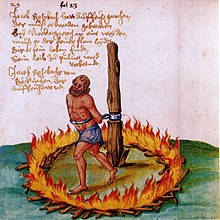Capital punishment
However, states have also imposed punitive executions, for an expansive range of conduct, for political or religious beliefs and practices, for a status beyond one's control, or without employing any significant due process procedures.[14] In pre-modern times the executions themselves often involved torture with painful methods, such as the breaking wheel, keelhauling, sawing, hanging, drawing and quartering, burning at the stake, crucifixion, flaying, slow slicing, boiling alive, impalement, mazzatello, blowing from a gun, schwedentrunk, and scaphism."Acts of retaliation underscore the ability of the social collective to defend itself and demonstrate to enemies (as well as potential allies) that injury to property, rights, or the person will not go unpunished.The Torah/Old Testament lays down the death penalty for murder,[19] kidnapping, practicing magic, violation of the Sabbath, blasphemy, and a wide range of sexual crimes, although evidence[specify] suggests that actual executions were exceedingly rare, if they occurred at all.[28] The Twelve Tables, the body of laws handed down from archaic Rome, prescribe the death penalty for a variety of crimes including libel, arson and theft.When abolishing the death penalty, Xuanzong ordered his officials to refer to the nearest regulation by analogy when sentencing those found guilty of crimes for which the prescribed punishment was execution.Strangulation was the prescribed sentence for lodging an accusation against one's parents or grandparents with a magistrate, scheming to kidnap a person and sell them into slavery and opening a coffin while desecrating a tomb.The 12th-century Jewish legal scholar Moses Maimonides wrote: "It is better and more satisfactory to acquit a thousand guilty persons than to put a single innocent man to death."[52] The severity of the so-called Bloody Code was often tempered by juries who refused to convict, or judges, in the case of petty theft, who arbitrarily set the value stolen at below the statutory level for a capital crime.In the past, cowardice, absence without leave, desertion, insubordination, shirking under enemy fire and disobeying orders were often crimes punishable by death (see decimation and running the gauntlet).In retentionist countries, the debate is sometimes revived when a miscarriage of justice has occurred though this tends to cause legislative efforts to improve the judicial process rather than to abolish the death penalty.More recent opposition to the death penalty stemmed from the book of the Italian Cesare Beccaria Dei Delitti e Delle Pene ("On Crimes and Punishments"), published in 1764.The penalty for crimes committed in peacetime was then reinstated and abolished again twice (1938–1953 and 1969–1978), but on those occasions it was restricted to acts of terrorism or subversion considered "internal warfare" and all sentences were commuted and not carried out.In the United Kingdom, it was abolished for murder (leaving only treason, piracy with violence, arson in royal dockyards and a number of wartime military offences as capital crimes) for a five-year experiment in 1965 and permanently in 1969, the last execution having taken place in 1964.[73] Protocol 13 to the European Convention on Human Rights, first entering into force in 2003, prohibits the death penalty in all circumstances for those states that are party to it, including the United Kingdom from 2004.In South Australia, under the premiership of then-Premier Dunstan, the Criminal Law Consolidation Act 1935 (SA) was modified so that the death sentence was changed to life imprisonment in 1976.[92] The only retentionist country in Europe is Belarus and in March 2023 Belarusian President Alexander Lukashenko signed a law which allows to use capital punishment against officials and soldiers convicted of high treason.[119] The support and sentencing of capital punishment has been growing in India in the 2010s[120] due to anger over several recent brutal cases of rape, even though actual executions are comparatively rare.A majority of countries are also party to the U.N. International Covenant on Civil and Political Rights (whose Article 6.5 also states that "Sentence of death shall not be imposed for crimes committed by persons below eighteen years of age...").[162][163] The past executions of Mahmoud Asgari, Ayaz Marhoni and Makwan Moloudzadeh became the focus of Iran's child capital punishment policy and the judicial system that hands down such sentences.[167][168] In 2013, Saudi Arabia was the center of an international controversy after it executed Rizana Nafeek, a Sri Lankan domestic worker, who was believed to have been 17 years old at the time of the crime.[181] Social historians note that beginning in the 20th century in the U.S. and western Europe, death in general became increasingly shielded from public view, occurring more and more behind the closed doors of the hospital.[190][191] Notably, drug couriers like Yong Vui Kong and Cheong Chun Yin successfully applied to have their death sentences replaced with life imprisonment and 15 strokes of the cane in 2013 and 2015 respectively.[213] There are many organizations worldwide, such as Amnesty International,[214] and country-specific, such as the American Civil Liberties Union (ACLU), whose main purpose includes abolition of the death penalty.[228]In one of the most recent cases relating to the death penalty in Singapore, activists like Jolovan Wham, Kirsten Han and Kokila Annamalai and even the international groups like the United Nations and European Union argued for Malaysian drug trafficker Nagaenthran K. Dharmalingam, who has been on death row at Singapore's Changi Prison since 2010, should not be executed due to an alleged intellectual disability, as they argued that Nagaenthran has low IQ of 69 and a psychiatrist has assessed him to be mentally impaired to an extent that he should not be held liable to his crime and execution.They also cited international law where a country should be prohibiting the execution of mentally and intellectually impaired people in order to push for Singapore to commute Nagaenthran's death penalty to life imprisonment based on protection of human rights.[274] Several international organizations have made abolition of the death penalty (during time of peace, or in all circumstances) a requirement of membership, most notably the EU and the Council of Europe.[283] The newly created South Sudan is among the 111 UN member states that supported the resolution passed by the United Nations General Assembly that called for the removal of the death penalty, therefore affirming its opposition to the practice.A total of 16 MEPs undersigned the letter expressing their grave concern towards the extended abuse of human rights in Bahrain following the arbitrary arrest and detention of activists and critics of the government.The attendees of the meeting were requested to demand from their Bahraini counterparts to take into consideration the concerns raised by the MEPs, particularly for the release of Abdulhadi Al-Khawaja and Sheikh Mohammed Habib Al-Muqdad, the two European-Bahraini dual citizens on death row.











States with a valid death penalty statute
States without the death penalty

Number of retentionist countries
Number of abolitionist countries







Death penalty in legislation, but not applied


Corporal punishmentDeath penalty (disambiguation)Death sentence (disambiguation)Execution (disambiguation)Capital punishment (disambiguation)UppercaseCriminal procedureFair trialPre-trialSpeedy trialJury trialCounselPresumption of innocenceExclusionary ruleSelf-incriminationDouble jeopardyAppealVerdictConvictionAcquittalNot provenDirected verdictSentencingMandatorySuspendedCustodialPeriodicDischargeGuidelinesTotalityDangerous offenderExecution warrantCruel and unusual punishmentImprisonmentLife imprisonmentIndefinite imprisonmentThree-strikes lawParoleProbationTariffLife licenceCriminal justiceExonerationHabitual offenderMiscarriage of justicePardonRecidivismRehabilitationRestorative justiceSex offender registrySexually violent predator lawsCivil procedureCriminal lawEvidenceUS courtsEnglish/Welsh courtsScottish courtsCanadian courtsUK courtsHomicideMurderjurisdictionAssassinationAttempted murderChild murderConsensual homicideContract killingCrime of passionDepraved-heart murderFelony murder ruleFoeticideHonor killingHuman cannibalismChild cannibalismHuman sacrificeChild sacrificeInternet homicideLonely hearts killerLust murderLynchingMass murderMass shootingMass stabbingMisdemeanor murderMurder for body partsMurder–suicidePoisoningProxy murderPseudocommandoSerial killerAngel of mercySpree killerThrill killingTorture murderVehicle-ramming attackWrongful executionJudicial murderManslaughterIn English lawVoluntary manslaughterNegligent homicideVehicular homicideAssisted suicideEuthanasiaJustifiable homicide"License to kill"Avunculicide/NepoticideFamilicideMariticideUxoricideFilicideInfanticideNeonaticideSiblicideFratricideSororicideParricideMatricidePatricideSenicideCrucifixionDeicideDemocideFriendly fireGendercideFemicide